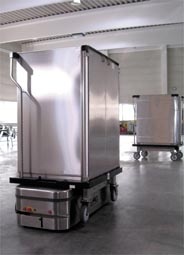Sharing the load
New to MEDICA this year is MLR, whose automated guided vehicles (AGV) have been radically modified transport containers in hospitals.

The underride tractors are based on MLR’s CAESAR range of AGVs, and are built entirely of stainless steel. All cover panels and the lift unit are completely sealed (IP54), so vehicles can be disinfected using hot steam jets from all sides – even underneath – in compliance with hygiene standards and can withstand temperatures of up to 85°C.
The AC drive systems are fully encapsulated to keep noise levels down and the drive technology is engineered to allow the AGVs to move forwards and backwards equally fast (maximum speed 1.7 m/s). Laser scanners at the front and rear of each vehicle ensure safety in both directions.
The first installation of the new vehicles in the Nye Ahus Hospital near Oslo, Norway, will be completed by early 2008.
Hall 16, Stand E41
14.11.2006





